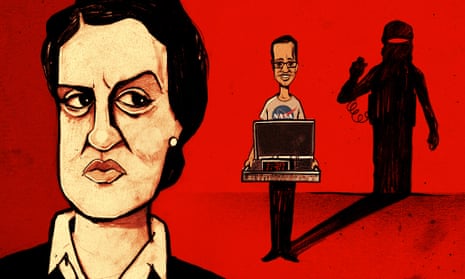So imagine you’re a teacher and there’s a kid in your class whose bag keeps emitting a loud, annoying beep. Eventually you demand he hand over whatever electronic contraband he has, only to find it’s something covered in wires and attached to a circuit board.
Do you A: assume it’s a bomb and alert the head, who calls in police, who handcuff this Sudanese-born child and drag him off to a juvenile detention facility for lengthy interrogation – before grudgingly accepting that he’s actually not a jihadi but a kid who loves inventing things, and this is his homemade clock? Or B: marvel once again at the way so many ethnic minority kids seem to excel at science and technology, and ask him to demonstrate it to the class?
Congratulations if you got the correct answer, unlike the staff of Irving independent high school in Texas, and indeed Irving police, who this week chose A when faced with a small, bespectacled wannabe engineer aged all of 14. Their treatment of Ahmed Mohamed has been disowned by everyone from the president down (“Cool clock, Ahmed,” Barack Obama tweeted. “Want to bring it to the White House?”). It’s hard to think of a more crushing experience for a young boy than realising how many people will judge him only on his race or religion, rather than the person he is.
So the right answer is, obviously, neither A nor B. It’s C: don’t assume anything, just find out the facts, and then make a decision based on those rather than on half-baked prejudices and lazy stereotypes. It’s not unreasonable for a teacher to ask what that ominously ticking thing is – just so long as they’d respond in exactly the same way to a white child with a homemade science project they brought in to show their engineering teacher.
Both police and the school have since insisted that colour didn’t come into it and that they were merely following protocol for potential hoax bombs. But they’ll have a job selling that to an America that has seen too many young black men shot dead by police officers overreacting to a threat that turned out not to exist – or indeed to a Britain that hasn’t quite forgotten Jean Charles de Menezes, the innocent Brazilian shot dead at a tube station in the jittery aftermath of 7/7.
Ahmed’s story thankfully has a happy ending, with invitations to the White House, and tech entrepreneurs offering internships, but it sends shivers down the spine nonetheless because so many similar stories have ended in tragedy.
The symbolic value of this boy being welcomed into the White House by a black president and an Asian government chief data scientist (who invited Ahmed to a presidential astronomy night) rather than by two white men should not be understated, then: they aren’t just paying lip service to the idea that children of colour can rise to the highest office, but actually embodying it.
It was impossible to read Obama’s response without remembering how long he’s been dogged by demented “birthers” accusing him of being a secret Muslim; or his recent remark that there’s no black professional his age who hasn’t at least once been mistaken for a valet or a waiter.
Yet Obama has arguably proved better at symbolism than at reforming policing to prevent young black men dying of what looks suspiciously like prejudice. The cultural change wrought by a black president, meanwhile, seemingly only goes so far: Republican presidential candidates wriggled awkwardly when asked about Ahmed and a rising tide of anti-Muslim discrimination at Wednesday’s televised debate, while Irving’s mayor Beth Van Duyne issued an extraordinary statement defending both school and police and adding that perhaps some of the recent atrocities in American schools and workplaces “could have been prevented and lives spared if people were more vigilant”.
As a white British parent I find all the #IStandWithAhmed stuff supporting him genuinely heartwarming; but were I a black parent with a son at school in Texas, or a daughter in a hijab on the streets of London, I’d probably swap it in a heartbeat for some concrete measures to ensure crude preconceptions and creeping Islamophobia did not put my children in danger.
And that’s the context in which today’s public intervention by Andrew Parker, the head of MI5, in the looming debate over extending counter-terrorism powers (again) should be seen. Whatever the merits or otherwise of increasing electronic surveillance – and that’s a whole other column – Ahmed’s story is a reminder not to be suckered in by the argument that those with nothing to hide have nothing to fear.
Only once in my life have I ever been yanked out of an airport queue, searched and grimly interrogated for an hour, and that was two decades ago, on a flight home from Israel. Once they’d made me strip to my underwear and methodically emptied out the contents of my shampoo bottle for analysis, my interrogators relaxed slightly and explained it was nothing personal really.
I’d just been flagged because, as a 19-year-old female flying alone, I fitted a specific intelligence profile (something, they hinted, about young women being drawn into love affairs with PLO fighters). It didn’t bother me particularly, but then it wouldn’t, because in a lifetime’s encounters with all the usual kinds of security that was probably the only time that being a white, middle-class female hasn’t virtually guaranteed me the benefit of the doubt.
Unlike an old friend, now an NHS consultant, I didn’t spend half my 20s being pulled over when driving at night by police officers suspicious of a young Asian guy in an expensive car. Nightclub bouncers never searched me, I never get stopped by customs, and if my handbag started beeping ominously the bomb squad probably wouldn’t be called in.
People like me – and parliament being the sort of place it is, the majority of those voting on counter-terrorism bills are probably people like me – have little to fear: not just because we lead boring lives but because fear is still not distributed fairly. We know in theory that powers can be misused, people mistreated; but to be blunt, it’s not likely to be us. It’s more likely to be some kid whose surname is Mohamed.
If #IStandWithAhmed is to be anything more than a fleeting hashtag, it should remind us to stand with those who have nothing to hide but still too much to fear.

